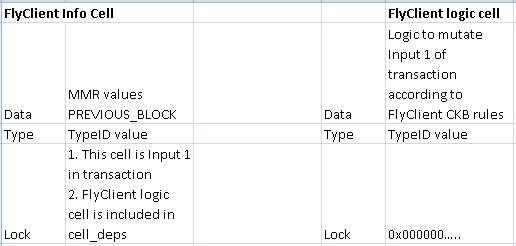thank you @Cipher for your feedback!
I was seeing this as primarily run as an off-chain service but hadn’t thought through all of the nuances that would need to be addressed.
The data that is contained in the MMR will allow a user to verify the integrity of the information they are getting (the hashes check out), however this will only deliver certainty that it is properly formed, not that it is accurate.
FlyClient has been designed so the light client can request proofs from a number of nodes and then choose the best one. For a centralized solution, we don’t want users to have to compare multiple sources.
Addressing data accuracy
I think ideally the user should be able to validate the information they are receiving strictly based on what is contained in the transaction.
In order for the user to trust what they are receiving, we can use a static value that identifies the FlyClient info cell. If the user is aware of this value, they can simply check the transaction for it. My idea is to use a TypeID to identify the FlyClient info cell.
(Without this, a different user could deploy a cell with the same data structure and use the FlyClient CKB type script to create bad data)
Any user with a full node can validate that the information that created the cell referenced by the TypeID was correct. After this is widely known and verified, users only need the TypeID and can trust the execution of CKB.
I came up with a scheme to do this, I haven’t grokked all of the intricacies of CKB programming yet so please check if this makes sense. We should probably also hard-code a value for number of header_deps to simplify execution.

The centralized server can deliver the latest commitment transaction and merkle inclusion proof, the client will see the TypeID associated with the FlyClient info cell in the transaction and establish certainty that it is correct. The client can then request the traditional FlyClient proof from the server as well, and download block headers to gain confidence in the transaction’s inclusion in the chain.
Users can get the block headers from a centralized server or network of full nodes, similar to SPV in Bitcoin.